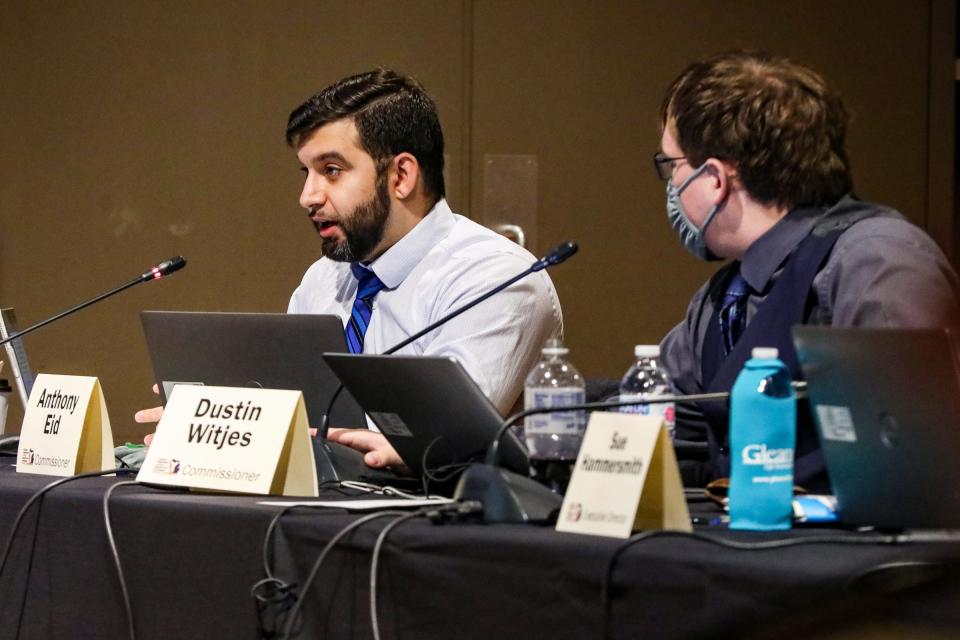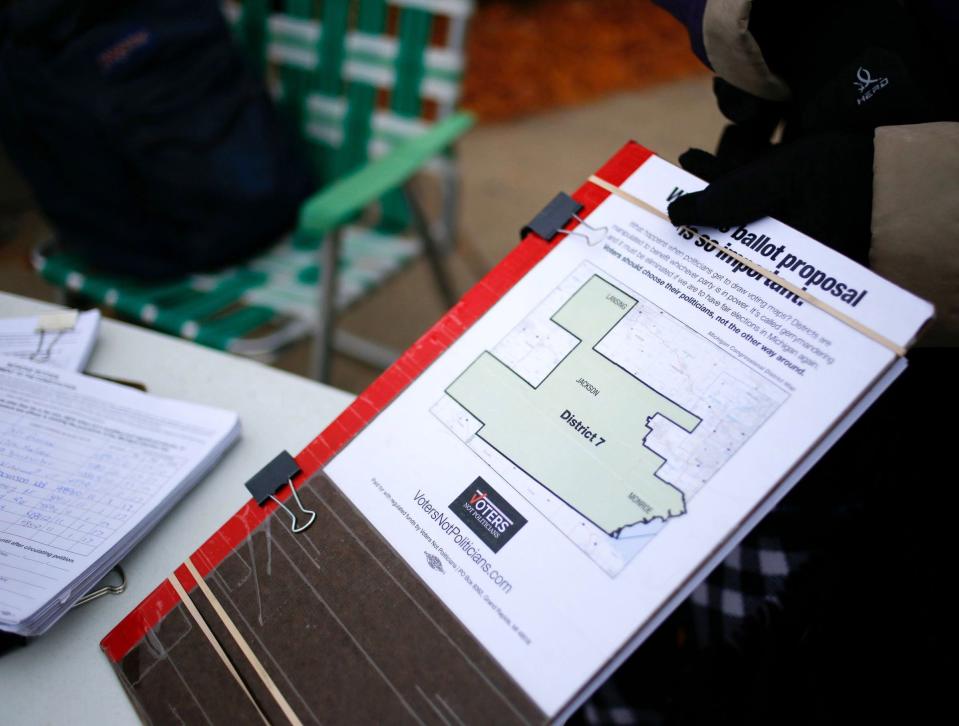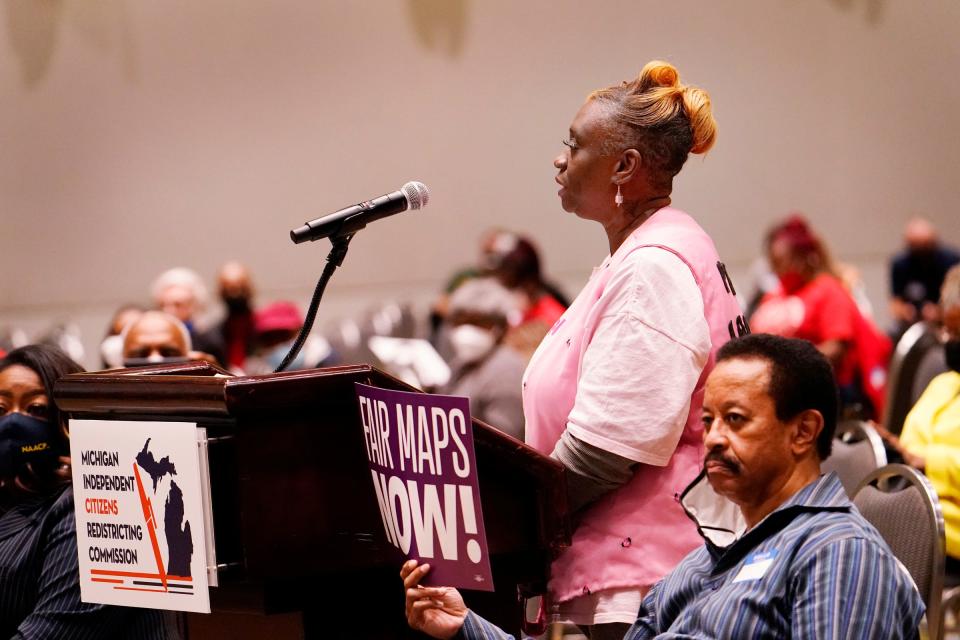Redistricting experts weigh in on results of first general election under new maps
Results from the first general election held under new maps drawn by Michigan's independent redistricting commission seemed to demonstrate that the group achieved its aim of drawing fair maps while underscoring Black Detroiters' concerns that they took a hit in the process, redistricting experts said during a panel Wednesday night.
The redistricting commission made up of randomly selected Democratic, Republican and independent voters charged with drawing congressional and state legislative districts in the state sought to bring an end to gerrymandering, the practice of drawing voting boundaries designed to benefit one political party.

Democratic candidates who won more votes statewide in the recent midterm secured slim majorities in the state Legislature, said Matt Grossmann, director of the Institute for Public Policy and Social Research of Political Science at Michigan State University.
"That wasn't the case over the last few cycles," he said during the panel hosted by the Center for Local State and Urban Policy at the University of Michigan's Ford School of Public Policy. "Even when parties got a similar share of statewide votes, they didn't get that share of seats." But the new maps "allow the statewide vote to match the seat count," he said.
More:How redistricting played big role in Michigan's midterm election
More:Democrats to walk tightrope with narrow majorities in Lansing
Democratic congressional and state legislative candidates received about 51% of the votes statewide while Republican candidates received about 49%, translating to a 7-6 Democratic majority in Michigan's congressional delegation, a 20-18 majority in the state Senate and 56-54 majority in the state House.
Before Michigan voters approved a ballot proposal to create the redistricting commission, a GOP effort called Project REDMAP targeted the state's mapping process to help bolster Republicans' electoral prospects in Congress and state Legislatures. Analyses deemed Michigan's GOP-drawn maps in place for the previous decade some of the most gerrymandered in the country.
"We were like a poster child for Project REDMAP and what happens when your politicians really have no shame in trying to grab as much power as you can," said Nancy Wang, executive director of Voters Not Politicians, the group behind the constitutional amendment that established Michigan's redistricting commission.

Now anti-gerrymandering advocates see Michigan as a national model.
"The question that we often get is do you think this is successful, and it's an emphatic yes," Wang said.
"I think Michigan is going to play a very important poster child role moving forward," said Moon Duchin, a mathematician at Tufts University who helped Michigan's commission review mapping input during the redistricting process.
While the Michigan Constitution does not require the commission to achieve fair maps by increasing the number of competitive districts, that's the approach that the inaugural group of commissioners took.
Zach Gorchow, executive editor and publisher of Gongwer Michigan, said increased competition means more expensive campaigns to win control of the state Legislature. "We saw unbelievable sums of money sent into Michigan, so I suppose if you're not a fan of money in politics ... that's probably not going to be an outcome of this."

Opponents of the new maps have criticized the commission's decision to reduce the share of Black voters in congressional and state legislative districts that run through Detroit, the nation's largest majority-Black city. Overall, Black Detroiters' representation in particular seemed to take the biggest hit under the new maps, Grossmann said.
Congressman-elect Shri Thanedar's victory in a Detroit-based congressional district following a crowded Democratic primary along with the reelection of U.S. Rep. Rashida Tlaib, D-Detroit, means the upcoming term marks the first time Detroit will not send a Black representative to Washington, D.C., in nearly 70 years. John James, a Republican who'll represent the newly drawn 10th Congressional District that includes part of Macomb County along with Rochester and Rochester Hills, will be the only Black member of Congress from Michigan.
Meanwhile, the Michigan Senate will see the number of Detroit lawmakers representing the city go from five to two and the state House from seven to six.
"Unfortunately, some might perceive the success of the commission as tied to this potential, that perhaps we couldn't get fair maps without undermining Black representation in Detroit. I don't think that's true," Grossmann said. Instead, he said the commission unnecessarily moved Black voters into districts with white Democrats in ways that didn't affect the partisan balance of the maps.
Wang noted that the commission currently faces a federal voting-rights lawsuit that alleges the state legislative maps it drew illegally disenfranchise Black voters. The outcome will help determine whether the maps provide an opportunity for Black Detroiters' to elect their preferred candidates. But she said that the commission could have done a better job responding to public concerns.
Duchin echoed the comment. "There's a question of legal compliance with the Voting Rights Act, but there's also a question of procedural fairness, and I do think that we were hearing the voices of Detroiters coming to the commission and worrying about the maps.
"I'm confident that in the next cycle the commission will pay closer attention," she said.
Clara Hendrickson fact-checks Michigan issues and politics as a corps member with Report for America, an initiative of The GroundTruth Project. Make a tax-deductible contribution to support her work at bit.ly/freepRFA. Contact her at chendrickson@freepress.com or 313-296-5743. Follow her on Twitter @clarajanehen.
This article originally appeared on Detroit Free Press: Experts evaluate Michigan's redistricting commission maps

